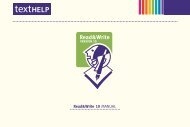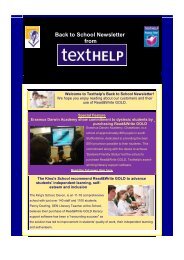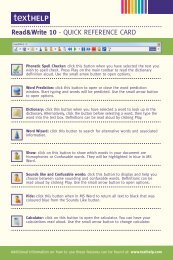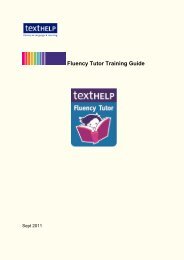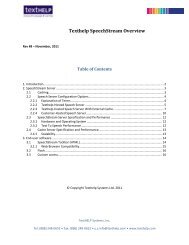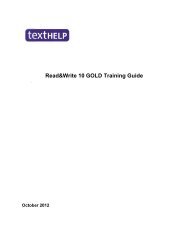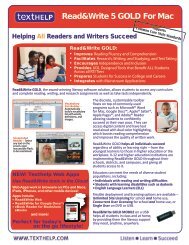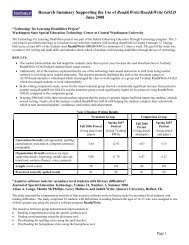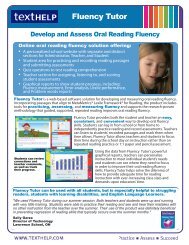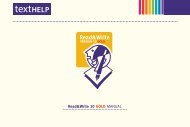01 NRDC Dyslexia 1-88 update - Texthelp
01 NRDC Dyslexia 1-88 update - Texthelp
01 NRDC Dyslexia 1-88 update - Texthelp
You also want an ePaper? Increase the reach of your titles
YUMPU automatically turns print PDFs into web optimized ePapers that Google loves.
Developmental dyslexia in adults: a research review 59<br />
With respect to adult ‘ordinary’ poor readers, who do not have a naming-speed deficit, there<br />
is evidence that fluency can be taught and that developing fluency can sometimes lead to<br />
increases in reading achievement (Kruidenier, 2002). However, whether a core deficit in visual<br />
naming speed will prove as amenable to treatment as a phonological deficit has not been<br />
thoroughly investigated (Lovett et al., 2000b). While intensive phonological interventions have<br />
led to improvements in reading accuracy, they have had little effect on fluency (Torgesen et<br />
al., 20<strong>01</strong>). However, there are indications that, at least for interventions involving children,<br />
teaching programmes can be designed to enhance fluency in participants with naming-speed<br />
impairments (Lovett et al., 2000a; Wolf et al., 2000b).<br />
There is evidence that interventions can enhance fluency in adult ordinary poor readers.<br />
We do not know yet if interventions can enhance reading fluency in dyslexic adults.<br />
Limitations of the double-deficit hypothesis<br />
The double-deficit hypothesis ‘has never been conceptualised as a total explanation of<br />
dyslexia’ (Wolf & Bowers, 1999). Like the phonological deficit hypothesis, it does not address<br />
all the problems experienced by some persistently poor readers. Meanwhile, conflicts of<br />
evidence as to the independence of naming-speed deficits from phonemic awareness deficits<br />
have yet to be resolved. The appearance of independence has been attributed to failure to<br />
control for letter-knowledge (de Jong & van der Leij, 1999), while the greater severity of<br />
impairment associated with a double deficit has been attributed in part to a statistical artefact<br />
caused by grouping children based on their performance on two correlated continuous<br />
variables, at least as far as some poor readers are concerned (Schatschneider et al., 2002).<br />
Opinions differ widely as to the proportion of dyslexic people with a reading rate deficit, a<br />
difference that may reflect variation in the methods used to identify research samples. It may<br />
also be the case that differences between groups are invalid at the level of the individual: in<br />
one study, when individual participants were investigated, it was found that approximately<br />
53 per cent of the dyslexic poor readers and 42 per cent of ‘ordinary’ poor readers had<br />
reaction times equal to or faster than those of the good readers (Catts et al., 2002). This<br />
finding might or might not be replicated; until the question is decided, we must suspend our<br />
judgement.<br />
We are not yet in a position to assess the usefulness of the double-deficit hypothesis in<br />
explaining dyslexia.<br />
<strong>Dyslexia</strong> and automaticity: the cerebellar deficit hypothesis<br />
Introduction<br />
Reading is a complex skill (Carr et al., 1990). When we read a single word, our brains make<br />
separate computations sustained by distinct neural areas, involving visual integration of the<br />
word, access to its phonological code, access to its semantic meaning, access to the structural<br />
form of the object that it represents (where that is applicable) and access to its learned output<br />
(Posner et al., 1997). If each of these component processes required attention, our attentional<br />
capacity would soon be overwhelmed (LaBerge & Samuels, 1974); decoding would then<br />
become laboriously slow and we would have little if any attentional capacity left for



